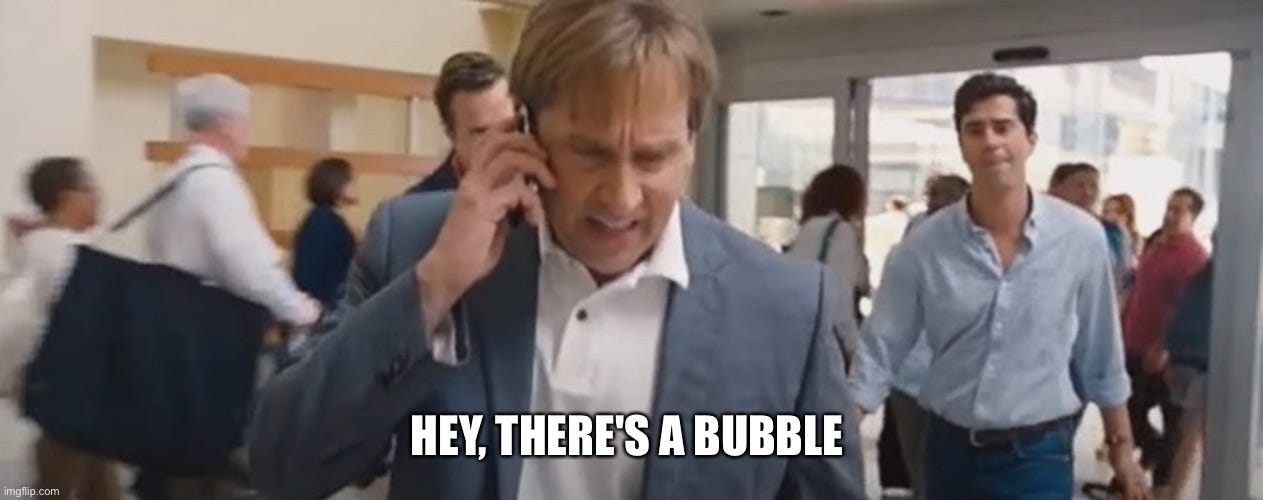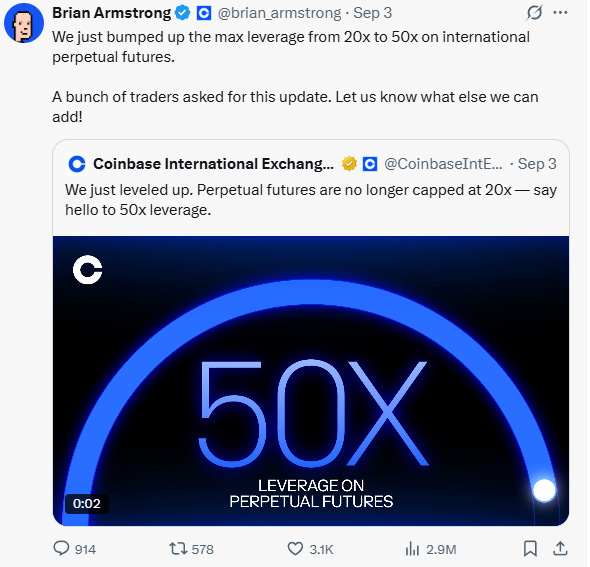You Can't Die
+ market memes
~8-10 min read. Philosophical post. If you’re just here for the money you’ll have to wait for the ELV report next!
“I must not fear. Fear is the mind-killer. Fear is the little-death that brings total obliteration. I will face my fear. I will permit it to pass over me and through me. And when it has gone past, I will turn the inner eye to see its path. Where the fear has gone there will be nothing. Only I will remain.”
— Litany Against Fear; Dune (1965), by Frank Herbert
Before we begin, wtf is this:
So I re-activated my Twitter X account to learn how the hell you advertise and grow a Substack (because I’ve put 0 effort into marketing), and I saw this from the CEO of Coinbase.
I asked Google & ChatGPT for a summary so I could quickly learn the mechanics (because… “futuros perpetuos” ¿que es eso?). I read, letting my conscious analytical functions decide if my intuitions were right or not. Within about five seconds, my bullshit detector was ringing like klaxons in a submarine with torpedoes inbound. In this situation — and when I’m not concerned with maintaining my relationship with the speaker — I have a go-to phrase:
“So let me get this straight…”
…this is a futures contract that is (1) tied to an imaginary digital asset which (2) does not ever expire and redeem in terms of that asset, and (3) can be purchased with only 2% cash collateral.
Riiiiiiiiiiiiiiiiiight. So… you mean like… credit default swaps tied to collateralized debt obligations tied to sub-prime mortgage loans where the borrowers didn’t fill out the mortgage application paperwork with their real names or jobs? Like that?
I think I have a picture for this:

Why can’t people just buy cash-generative assets that have real, productive, growing economic value to society? I.e., buy businesses. Own businesses. Good ones. Buy them for reasonable prices. Have a margin of safety. It’s so f****** simple.
Brian Armstrong is the CEO of Coinbase by the way.
OK now we can begin…
Between full-time roles, I had a lot of time to think. I wrote to you about Stoic philosophy, for example. After COVID, for example, I realized I don’t think I ever want to be “retired” unless I’m somehow incapacitated. Leisure is rejuvenation to me, but not a full-time activity because it brings fun but not satisfaction.
This post is similar — it’s also the result of excessive thinking & reflection. It’s a combination of two ideas.
First: You Can’t Die.
Obviously, I don’t mean this literally. We must eventually all die. We are a complex assemblage of electrochemical and molecular activity so intricate it’s impossible for us to fully comprehend ourselves. But, entropy must increase. We must suffer injuries and accidents. Our DNA must degrade. Our bodies must senesce. It is useful to live with the idea “we are eventually all going to die” in mind, so that we live better.
I mean it in a different sense today.
I mean, our mental machinery concerning death is flawed. We evolved to survive on the African savannah, not to thrive in a technological civilizations. One of the most pervasive mal-adaptations we carry with us is fear.
Fear is for self-preservation. It wants the body to avoid harm, injury, and death. It wishes for us to survive by avoiding danger.
It’s an emotional and physiological response, stimulated by some threat. Brain structures and glands fill our bodies with chemical signals — hormones like adrenaline and cortisol tell the body “get ready right now”. Our reflexes quicken. Our pupils dilate to enhance vision, our hearing becomes acute. Our executive function (high-level rational thinking) is turned down. The nervous system is turned up and our muscles tense. Our breathing and heart rate increase to flood the blood and tissues with oxygen for energy. Food digestion stops. It is time to survive.
Fear is so old it’s not even human. We know because fear is common. Reptiles, fish, birds, and even insects display fear and respond to threats. The common ancestors of these are animals living hundreds of millions of years ago. Fear was built into many forms of life. It survived across life because it was useful.
Fear is very old, and very powerful.
Fear is not very useful to humans living in a technological society today, with low rates of imminent violence, starvation, environmental threats, etc. We are nearly always quite safe, and don’t need to be constantly vigilant.
Yet it’s still there. And very strong. So strong we let it dictate our behavior more often than we should.
Should you move to America or Germany or Japan to start a new life? Maybe not. It’s scary. Should you ask out that really cool, attractive person? Maybe not. It’s scary. What if something bad happens?
If you play any of these scenarios out, what is the probability you will be physically harmed or injured in some way you can’t recover from? Is that cute girl at the gym going to chop of your arm? Are the people of Japan going to bar you from entering their grocery stores, causing you to lose access to resources and starve?
You are generally at no real risk in most modern, civilized situations, right?
But the emotional mind is coded to induce fear when you perceive an external threat. Even threats that aren’t survival threats.
This is when and why it’s not useful.
Recently I was listening to a talk by a very successful businessperson. He was talking about failure, accomplishment, and life satisfaction. And at one point he said something like “everything you want is on the other side of fear.”
This is part of the point. We should just try things sometimes. We should condition ourselves to realize there is no actual threat.
I noticed I react with fear to a lot of things. Because I’m a trained investor, usually my brain automatically goes to a decision tree and wants to know “ok, what usually happens in these situations, and thus which choices can I make that are reasonably good risk/reward, and what should I avoid”.
That’s fine and good and all, but — for me at least — it doesn’t lessen the feeling of fear. Also, while the above model is very useful, it isn’t always the first one should be reaching for.
So instead, I’ve started saying to myself “you can’t die” or “this can’t kill you.” It’s to remind myself that fear is useful and important sometimes, keeping us alive. But that it’s not useful in this moment. And so I should take an action without consideration of that fear.
This can’t kill you. You can’t die.
(Unless you buy those perpetual futures on bitcoin with 50x leverage. That may kill you.)
Second: Nobody Cares. It’s Your Life Only.
The second thing I recently had been thinking about is how little we care about other people’s lives. It’s not disingenuous or evil or anything. Obviously, we do care about people like our friends, family, and colleagues. We often wish well for them, or we often want to get together.
What I mean is, usually, each of us already has a lot on our plate at a given moment. So how much room can there really be to think deeply about others in each and every one of those moments? Do you remember all the people that passed you on the sidewalk or the road this week? Of course not. Our brains just aren’t that big.
Look at it another way: do you think about whether one of your friends is making the right decisions or whatever? Or do you mostly just consider “well, they made that choice, it looks like what they want, and they seem content with the choice”, right? Do you care one person drives a truck and another person is Senior Vice President at a bank? Not really.
The kicker: but we’re usually really concerned about the reverse — what others think of us.
Most people think like the above. If you are choosing your job, they don’t think “that’s the right/wrong job.” They usually think “I’m glad/indifferent you got the job you wanted, let’s go for drinks!”
(In fact, the only people who really, really care about all of your choices are often the people you should ignore. They are the people who want to control your behavior. Aren’t they?)
Like fear, this is also instinctive behavior, with evolutionary roots.
We evolved to ensure we obtain social acceptance. It is believed that’s because we, primates, and many other mammals are social creatures who often live in tribes. If we behave in accordance with what we think that others think is acceptable, then we won’t get kicked out of the group. To be kicked is evolutionary death for humans and many of our cousins: we lose access to mates, resources, etc.
(There human are tribes that kill useless people or those who are a net drain on the tribe’s resources. Not kidding: there is one tribe that will basically agree it wasn’t in anyone’s interest for you to be around, so usually, a strong male would quietly walk up behind you with a heavy rock or club, hit you hard over the head, and that’s that.)
This instinct is also over-tuned for today’s world, too, though. I mean, it’s good not to be a jerk or a murderer. But there are too many choices that we make based on what others think when in fact it doesn’t matter. They don’t care what kind of house you chose, honestly.
So choose for yourself, don’t choose to impress others.
This isn’t always easy to see because we trick ourselves, but there are questions we can ask ourselves. Are we prestige-seeking? I.e., doing something simply for status recognition? Or seeking approval? These kinds of things are signs we might not be making the optimal choice for ourselves.
This is useful to avoid not only because it means we’re not choosing what’s best, but also because it’s a fool’s errand, anyway. For example, how do you know other people will be impressed? Are you sure? What if they don’t care? Or… what if they do care, but their tastes and interest change afterward, and they no longer care?
I mean, your sense of achievement is totally conditional on what other people think and want. How could that ever bring lasting happiness when you can’t control what other people think and want, and those things are always subject to change?
It’s ultimately a hopeless and unfulfilling way to live.
Over time, realizing this has helped me stopped making decisions this way. And to instead think: okay, internally, what do I feel is best for me? And how do I best position myself to contribute to the world and to derive self-satisfaction?
Choose for yourself. Because only you really live and experience your life.
I hope these frames help you in your decisions and actions.
— Chris



I LOVE your philosophical posts! You should do more of them. I think the last one was around Christmas, if I’m not mistaken.
Anyhow, thanks for sharing your thoughts. 100% agree with both. And I say this as someone who struggles with the second one often.